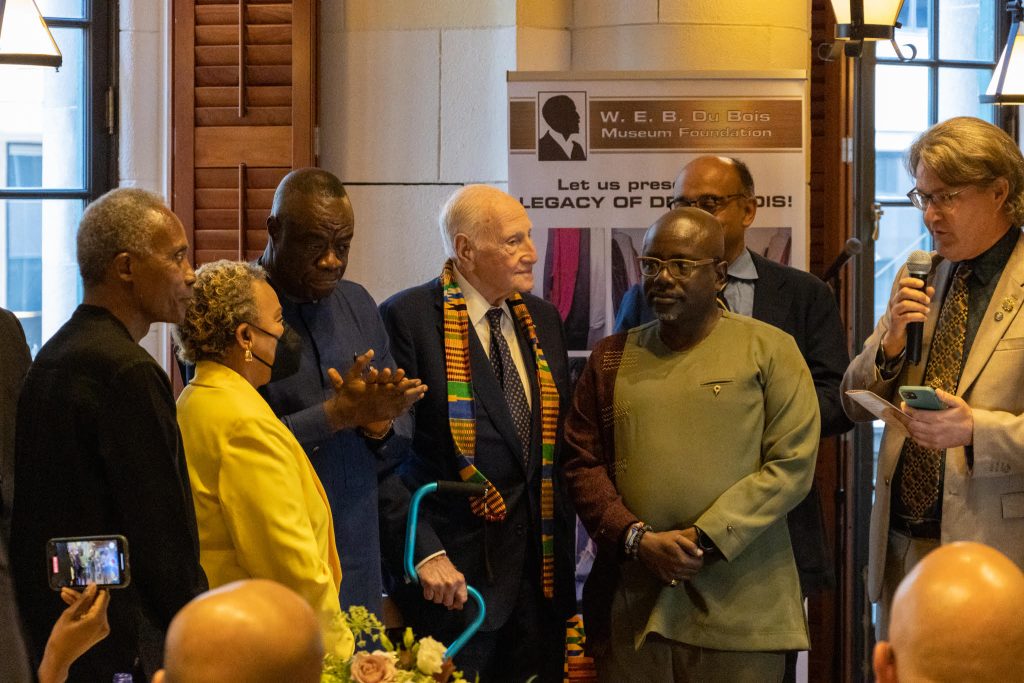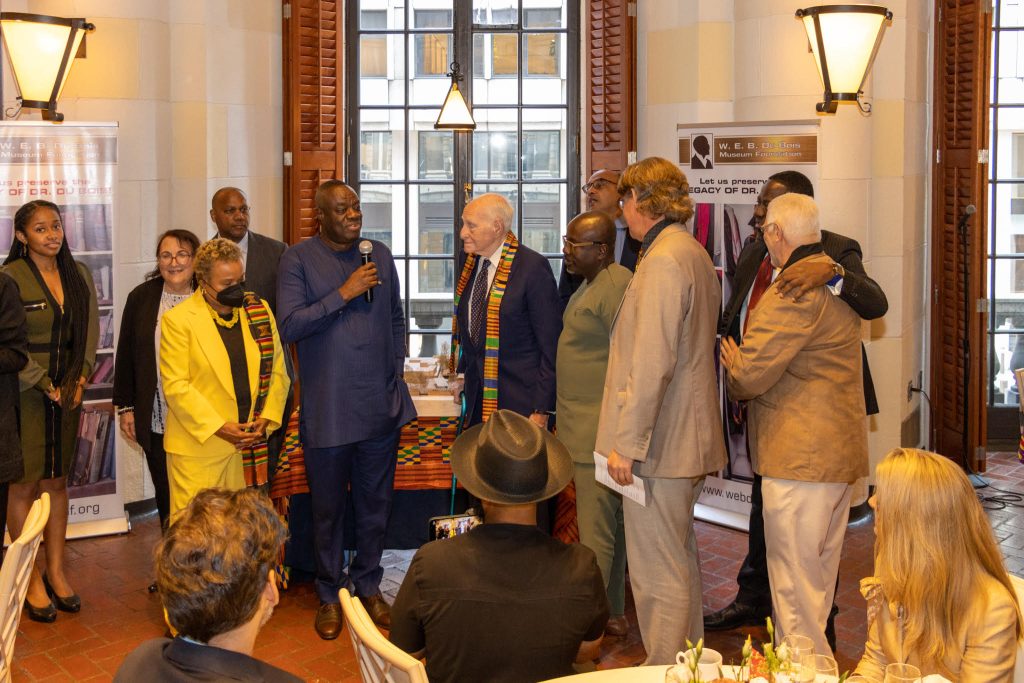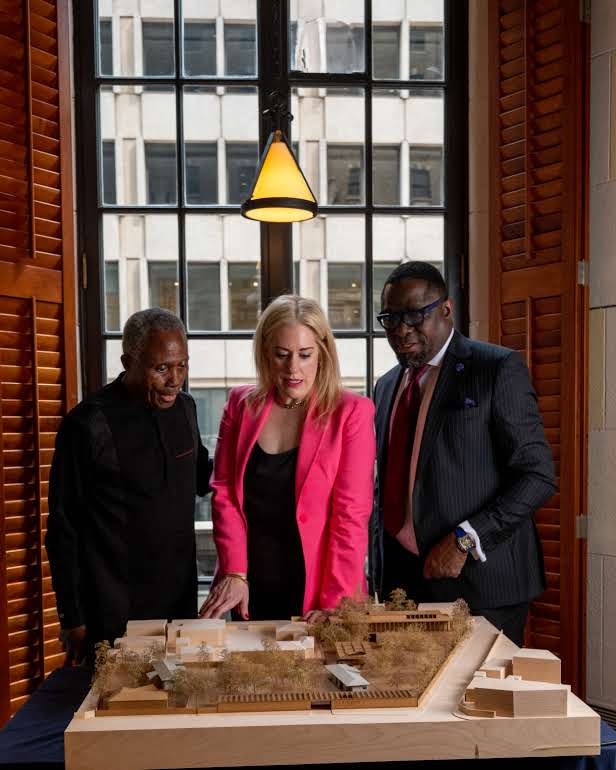by Michael Oliva
The W.E.B. Du Bois Museum Foundation recently unveiled plans and renderings for a redeveloped W.E.B. Du Bois Museum Complex, located in Accra, Ghana, and designed by Sir. David Adjaye, the internationally acclaimed architect of the Smithsonian Museum of African American History and Culture.
On Sunday, September 18th, dignitaries including Ghana Tourism Minister Dr. Ibrahim Mohammed Awal, philanthropist and Foundation Chairman Daniel Rose, Congresswoman Barbara Lee (D-CA), U.S. Ambassador to the U.N. Linda Thomas-Greenfield, Philosopher Kwame Anthony Appiah, Foundation President Japhet Aryiku, and great grandchildren of W.E.B. Du Bois, Jeffrey Peck and Arthur McFarlane II, gathered together for a celebratory event at the Yale Club in Midtown Manhattan. Also in attendance were dozens of luminaries and supporters who witnessed the unveiling of a 3-D model of the proposed museum site, as well as visual renderings of each planned building.
Aryiku, the Du Bois Museum Foundation President, spent his entire career in the Finance Division at JPMorgan Chase from where he retired in 2001 as Vice President and Unit Chief of Staff. He started with Manufactures Hannover Trust, then Chemical Bank, then Chase and JPMorganChase. Among his mentors were Peter Tobin, then CFO and whose name honors the St. John’s Business School, Eugene McQuade, former Controller and retired Vice Chairman of Citigroup and Dina Dublon, former CFO.
While a Du Bois museum currently stands in Ghana, the site will be radically upgraded and modernized to attract international audiences. The expansion, transformation, and repositioning of what is now called the Du Bois Centre will make it a dramatic global center for tourism, study, and celebration of the Pan African diaspora. Significant upgrades to the facility are intended to help introduce a new generation of Africans, Americans and people from around the world to the vision and writings of W.E.B. Du Bois, arguably the most important African American intellectual of the 20th century. The Centre will also serve as the starting point for visitors returning to Africa to explore their roots, and include a scholastic institute, library, outdoor auditorium, memorial pavilion, craft shops for artisans, a café, and large open spaces for formal gatherings and lectures.
“Redeveloping and restoring this historic center is crucial in preserving the legacy of the father of Pan-Africanism so that generations to come can see how his work contributed to American History,” said Mr. Rose. “It has been our mission to honor Dr. Du Bois and his family. Our hope is that this center will be a mecca for intellectual thought and excellence, and a catalyst in bridging our communities across the diaspora together.”
The W.E.B Du Bois Museum Foundation is a New York-based non-profit organization established in 2019, with the exclusive mission of honoring the life, purpose, and legacy of the celebrated father of Pan-Africanism, Dr. W.E.B. Du Bois, by redeveloping and rebranding his final resting place in Accra, Ghana. The intention and dedication of the Foundation is to revive the current Du Bois Memorial Centre into a Museum Complex and as a destination for scholars, artists, and heritage tourists alike.
W.E.B. (William Edward Burghardt) Du Bois was a groundbreaking titan of modern African American letters and inspired the work of the large majority of modern African American intellectuals to follow. He reshaped how the long and complex experience of African American history and life could be thoroughly understood, leaving Americans of all colors a legacy of intellectual tools and a foundational language with which they can analyze their present and imagine a future.
Du Bois played a key role in developing the strategy and program that dominated early 20th-century black protest in America and was one of the founders of the NAACP. Du Bois’ collection of essays, “The Souls of Black Folk,” is a seminal work in African American literature and a founding work in the literature of black protest. In it, he eloquently affirmed that it is beneath the dignity of a human being to beg for those rights that belong inherently to all mankind.
“The expansion of this museum is a pivotal moment in American and Ghanaian history. Seeing my great grandfather honored in this way, knowing his legacy and work will continue to have an impact on the lives of so many now and in the years to come is truly a special moment for me and my family,” said Mr. Peck.
In 1961, Kwame Nkrumah, former President of Ghana, invited Dr. Du Bois to move there in order to undertake an ‘Encyclopedia Africana’, an interdisciplinary global publication to document the experience and historical contributions of African peoples throughout the world. Du Bois lived there with his wife, Shirley Graham Du Bois, until his death on August 27th, 1963—the day before his American compatriots assembled for the March on Washington. Ms. Du Bois was also a prolific American award-winning author, playwright, composer, and activist for African American and Chinese causes. Mr. and Ms. Du Bois are both buried at the Centre.
As part of the renovation the museum will be transformed, repositioned, and expanded while retaining the current structures, the Bungalow and the Gazebo Mausoleum, which will be incorporated into the new W.E.B. and Shirley Du Bois Memorial Pavilion. The Bungalow will be restored, as closely as possible, to its original state. A separate Museum and Library will be built to house the books, journals, papers, and other written and visual collections of the Du Bois family.
In the wake of the unveiling, the Foundation will continue to raise money and awareness around the cause over the next several years. “We had a wonderful event, but it is just the beginning. There is still much work to be done,” said Mr. Aryiku. He aims for the complex to be fully completed and dedicated by 2025.



